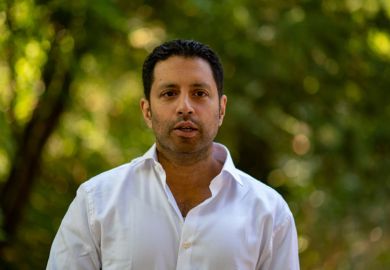Almost nine in 10 students in England say they feel free to express themselves on campus, according to the results of the latest National Student Survey (NSS).
Including the question for the first time, the Office for Students (OfS) asked undergraduates how free they felt to express their ideas, opinions and beliefs, and received around 280,000 responses across providers in England.
Of them, 38 per cent said they felt very free, and 48 per cent said they felt free – meaning 86 per cent responded positively to the question.
Campus resource: A DIY guide to protecting academic freedom
Of all the questions asked by the OfS in this year’s survey, this was among the most positive outcomes.
A further 11 per cent of responses reported feeling not very free to express their ideas, and just 3 per cent said they were not free at all.
Rates were even higher among those on any undergraduate course below the level of a bachelor’s degree, with 91 per cent saying they felt free or very free.
The results come just a few months after the OfS appointed Arif Ahmed as England’s first ever free speech “tsar” to implement new legislation promoting freedom of speech.
John Blake, director for fair access and participation at the OfS, said it was not going to be the case that everyone had concerns about freedom of speech.
“It’s an issue of concern to us to see any proportion of students who feel uncomfortable expressing their views, and we will look very carefully at that as we move forward with the implementation of the new act,” he said.
But Jonathan Grant, founding director of Different Angles, a consultancy that focuses on the social impact of universities and research, told Times Higher Education that he was not surprised by the results showing a small minority of students had freedom of speech concerns.
“I think the debate on freedom of speech is overblown and not backed up by the evidence,” said Professor Grant, formerly vice-principal of King’s College London.
“This, along with the OfS’ own data on cancelling and no-platforming, suggests that speech is free at universities and that when things inevitably go wrong, given the high volume of events, they become overblown and politicised in a way that does a disservice to students and their institutions.”
Universities within the Russell Group recorded similar results to those across the sector, but there was significant variation across the prestigious grouping, which is often at the centre of headlines connected to free speech furores.
More than half of all undergraduates at the University of Oxford said they were very free to express their ideas, opinions and beliefs – one of the highest proportions of all universities in England.
Within the Russell Group, it was followed by the Imperial College London (46 per cent) and the University of York (39 per cent).
At the other end of the scale, 31 per cent of undergraduates at the University of Manchester said they felt very free.
The NSS – one of the largest surveys of its kind in the world, received more than 339,000 responses across the UK this year – although due to changes in its structure, limited comparisons can be made with previous years.
A key question on how satisfied students are with the quality of their course was removed for those in England, following record low satisfaction levels in recent years.
Among the results for students studying in England, only two questions received more positive responses than free speech – 91 per cent said teaching staff were good or very good at explaining things, and 89 per cent said they were very well or well supported by library resources.
By contrast, just 61 per cent of undergraduates said it was very clear or clear that students’ feedback on the course is acted on.
Ben Hunt, of higher education consultancy Strive Higher, said the NSS data on freedom of speech was “one which many industries would be envious of”.
“This does not mean that there shouldn’t be concern regarding students who have not answered positively; all students should feel able to express their beliefs within the law. However, this evidence shows that the high majority of students feel they can express their beliefs freely,” said Mr Hunt, speaking in an independent capacity.
“Institutions and the Office for Students should ensure future free speech regulation is proportionate given this evidence, particularly considering the cost of living and student concerns regarding how their course feedback is responded to, which sits at only at 61 per cent positive in this year’s results.”
Register to continue
Why register?
- Registration is free and only takes a moment
- Once registered, you can read 3 articles a month
- Sign up for our newsletter
Subscribe
Or subscribe for unlimited access to:
- Unlimited access to news, views, insights & reviews
- Digital editions
- Digital access to THE’s university and college rankings analysis
Already registered or a current subscriber?








